Related Research Articles

Mind Games is the fourth studio album by English musician John Lennon. It was recorded at Record Plant Studios in New York in summer 1973. The album was released in the US on 29 October 1973 and in the UK on 16 November 1973. It was Lennon's first self-produced recording without help from Phil Spector. Like his previous album, the politically topical and somewhat abrasive Some Time in New York City, Mind Games received mixed reviews upon release. It reached number 13 in the UK and number 9 in the US, where it was certified gold.
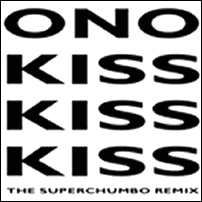
"Kiss Kiss Kiss" is a song by Japanese singer Yoko Ono. It was originally released on Double Fantasy, her joint album with John Lennon, as well as on the B-side of his "(Just Like) Starting Over" single. The disco and new wave-influenced song features Ono gasping heavily and appearing to reach orgasm.
"Remember" is a song by English rock musician John Lennon from his 1970 album John Lennon/Plastic Ono Band.
"Well Well Well" is a song by English musician John Lennon from his 1970 album John Lennon/Plastic Ono Band. The eighth and longest track on the album, "Well Well Well" features an aggressive guitar sound, screaming vocals and a pounding backing track.
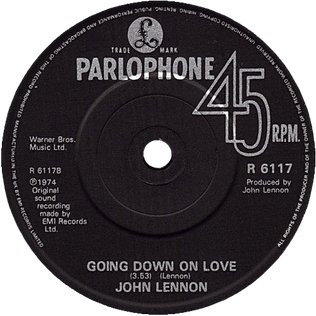
"Going Down on Love" is a song by John Lennon, released as the first track on his 1974 album Walls and Bridges. It was also released as the B-side of Lennon's "Jealous Guy" single in 1985.
"Old Dirt Road" is a song written by John Lennon and Harry Nilsson, first released on Lennon's 1974 album Walls and Bridges. Nilsson later recorded the song on his 1980 album Flash Harry.
"Out the Blue" is a song written by John Lennon and originally released on his 1973 album Mind Games. The song is included on the 1990 boxset Lennon, the 2005 two-disc compilation Working Class Hero: The Definitive Lennon, the 2010 album Gimme Some Truth and the 2020 compilation album Gimme Some Truth. The Ultimate Mixes.
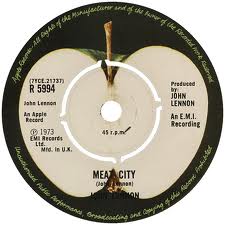
"Meat City" is a song written by John Lennon, released as the 12th and final track on his 1973 album Mind Games. The song is also the B-side of the single of the same name, and is included on the 2010 album, Gimme Some Truth.
"Nobody Loves You " is a song written by John Lennon released on his 1974 album Walls and Bridges. The song is included on the 1986 compilation Menlove Ave., the 1990 boxset Lennon, the 1998 boxset John Lennon Anthology, the 2005 two-disc compilation Working Class Hero: The Definitive Lennon, and the 2010 boxset Gimme Some Truth.

"Sisters, O Sisters", also known as "Sisters O Sisters", is a song written by Yoko Ono that first appeared on John Lennon's and Yoko Ono's 1972 Plastic Ono Band album Some Time in New York City, backed by Elephant's Memory. It was also released as the b-side to the couple's "Woman Is the Nigger of the World" single. It has been covered by a number of artists, including Le Tigre and Tater Totz.
"Born in a Prison" is a song written by Yoko Ono and first released on her 1972 album with John Lennon Some Time in New York City as part of their Plastic Ono Band project.
"New York City" is a song written by John Lennon that was first released on Lennon's and Yoko Ono's 1972 Plastic Ono Band album Some Time in New York City.
"We're All Water" is a song written by Yoko Ono that was first released on the 1972 John Lennon and Yoko Ono Plastic Ono Band album Some Time in New York City. It was the last song on the first record of the album, and the last song on the album that was recorded in the studio.

"What You Got" is a song written by John Lennon that was first released on his 1974 album Walls and Bridges. It was later released as the B-side to his top 10 #9 Dream single.
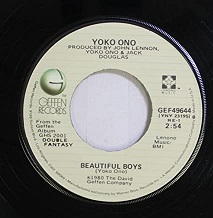
"Beautiful Boys" is a song written by Yoko Ono that was first released on Ono's and John Lennon's 1980 album Double Fantasy. It was later released as the B-side of Lennon's #1 single "Woman."
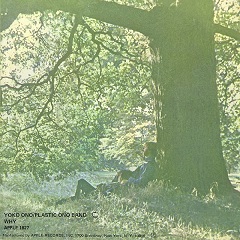
"Why" is a song written by Yoko Ono that was first released on her 1970 Yoko Ono/Plastic Ono Band album. In the U.S. it was also released as the B-side of John Lennon's "Mother" single, taken from his John Lennon/Plastic Ono Band album.

"Touch Me" is a song written by Yoko Ono that was first released on her 1970 album Yoko Ono/Plastic Ono Band. An edited version was later released in the U.S. as the b-side to John Lennon's single "Power to the People."

"Listen, the Snow Is Falling" is a song written by Yoko Ono and recorded by Ono and the Plastic Ono Band that was first released as the B-side of John Lennon's 1971 single "Happy Xmas ." A version of the song was later released on a reissue of Lennon and Ono's Wedding Album and was covered by Galaxie 500.
"Sunday Bloody Sunday" is a song written by John Lennon and Yoko Ono that was first released on their 1972 Plastic Ono Band album with Elephant's Memory, Some Time in New York City. The song addresses the Bloody Sunday massacre of 1972 and is one of two on the album that addresses the contemporary Northern Ireland conflict, "The Luck of the Irish" being the other.

"Beef Jerky" is an instrumental written by John Lennon that was released on his 1974 album Walls and Bridges and also as the b-side of the lead single from that album, the #1 hit "Whatever Gets You thru the Night."
References
- 1 2 "John Lennon: Aisumasen (I'm Sorry)". The Beatles Bible. Retrieved 6 September 2011.
- 1 2 3 4 5 Rogan, J. (1997). The Complete Guide to the Music of John Lennon. Omnius Press. p. 79. ISBN 0-7119-5599-9.
- 1 2 3 4 5 du Noyer, P. (1999). John Lennon: Whatever Gets You Through the Night. Thunder's Mouth Press. p. 74. ISBN 1-56025-210-3.
- 1 2 3 4 5 6 7 8 9 10 11 12 Urish, B. & Bielen, K. (2007). The Words and Music of John Lennon. Praeger. pp. 49, 116. ISBN 978-0-275-99180-7.
- 1 2 3 Blaney, J. (2007). Lennon and McCartney: together alone : a critical discography of their solo work. Jawbone Press. pp. 81, 83. ISBN 978-1-906002-02-2.
- 1 2 Miles, Barry; Badman, Keith, eds. (2001). The Beatles Diary After the Break-Up: 1970–2001 (reprint ed.). London: Music Sales Group. ISBN 978-0-7119-8307-6.
- ↑ Calkin, Graham. "Mind Games". Jpgr.co.uk. Retrieved 27 January 2013.
- ↑ Spore, K. (7 December 1973). "Beatles Reflected in Lennon Genius". The Milwaukee Sentinel . p. 25. Retrieved 20 December 2012.
- ↑ "John Lennon 101 – Day 4: The Lost Weekend (1972–1973)". PopMatters.com. Retrieved 7 January 2013.